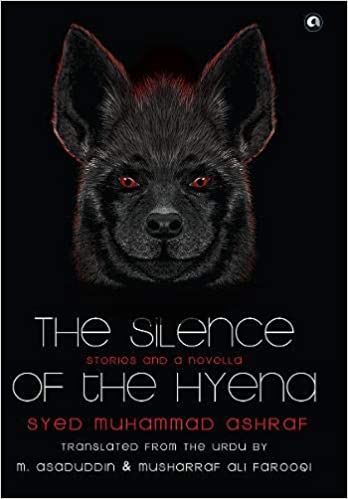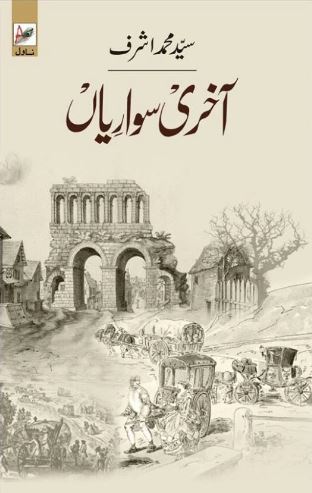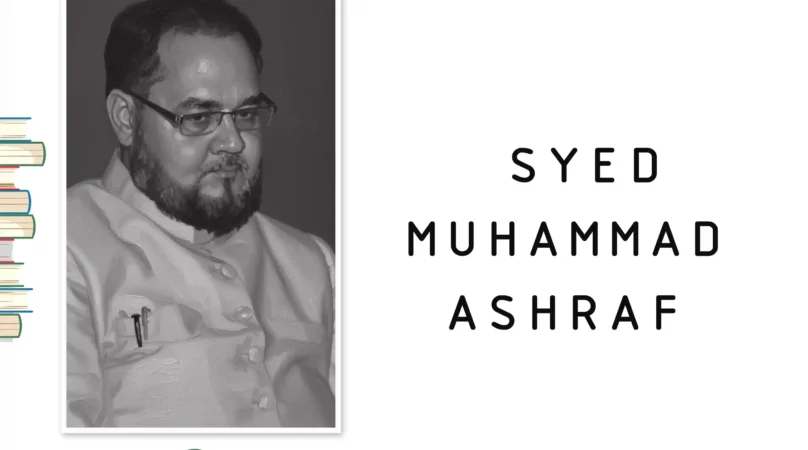
Syed Muhammad Ashraf is an acclaimed Urdu fiction writer and novelist. He was born on 8 July 1957 in Sitapur, a town in Awadh region in UP, India. He hails from a family of devoted scholars and Sufi saints of Marehra Shareef in Etah district of U.P. His father and ancestors headed the Khaqah-e-Barkatiyya, which has catered to the spiritual alleviation of people of all castes, colors, and creeds over the ages.
Ashraf’s literary inclination was developed and refined as he pursued his BA in Urdu literature at the prestigious Aligarh Muslim University (AMU). The AMU, known for its literary and elocutionary contests, provided the perfect platform for the blossoming of Ashraf’s creative genius. He took a prominent part in the co-curricular activities, particularly literary ones, evident from the several coveted posts he held at the AMU, ranging from Secretary, University Literary Club, Secretary AMU Great Books Club to Editor, Aftab Magazine. He was also the winner of various prestigious Debating Trophies.
Despite his preoccupation with literary activities and writing stories that gained wide acclaim on the University campus, Ashraf excelled academically, earning the highest academic distinctions by standing first in his BA (Hons.) and MA examinations and being awarded Gold Medals for his academic excellence. Soon after obtaining his Master’s degree, he appeared at the highly competitive Civil Service Examinations and set a new record in the history of UPSC by taking Urdu as the medium of examination and qualifying for the Civil Service.
In 1981, Ashraf joined the Indian Revenue Service and rose to be the first Income Tax Commissioner at Aligarh in 2007, after having served at important positions in the Income Tax Department at Nagpur, Agra, Kanpur, and Mumbai. Apart from discharging his professional duty, Ashraf holds the cause of education very dear to his heart. He has been instrumental in establishing educational institutions for the underprivileged in Kanpur, Marehra, and Unnao and founding the sprawling, top-quality educational complex, Al-Barkaat Educational Institution at Aligarh that imparts education of CBSE 10 +2/MBA/BE.d and other professions courses. Besides, he has delivered lectures on social, educational, and cultural issues at leading Indian universities and also at the Urdu Festival under the aegis of University of Virginia, USA.
Syed Muhammad Ashraf has been honored with the highest literary awards in India, including Sahitya Academy Award (2003), UP Urdu Academy Collective Services Award (2013), Madhya Pradesh Govt.’s ‘Iqbal Samman Award’ (2017), and ‘Katha award’ (1995). In 2008, he was awarded membership of Bhasha Samiti for Saraswati Samman, and in 2008 he was appointed as a member of the National Council for Promotion of Urdu Language (NCPUL). He is the founder Vice President of Al-Barkat Educational Institutions and Jamia Al Barkaat Aligarh and Al-Barkaat Public School.
Besides his fiction works, Syed Muhammad Ashraf has also written a biography of his father, titled ‘Yaad-e-Hassan,’ and published a collection of his naatia poetry titled ‘Sallu alaihe wa aalih.’ His contributions to Urdu literature have made him a subject of interest for M. Phil. students at universities such as Jammu University, Aligarh Muslim University, and Delhi University, where his novels ‘Dar se Bichrhe’ and ‘Number dar ka Neela’ are the focus of study.
One of his award-winning novels, ‘The Silence of the Hyena,’ has become an inextricable part of our daily lives. The novel has been praised for its seamless flow of real-life instances curated into the narrative, making for an interesting read. Syed Muhammad Ashraf has also used animals as metaphors to delve into the recesses of the human heart, showcasing his unique style of writing.
Books

Silence of the Hyena
Syed Muhammad Ashraf’s “The Silence of the Hyena” is a collection of short stories and a novella, originally written in Urdu. The book has been translated into English by two translators and takes the reader on a nostalgic trip to a world that is both familiar and distant. The stories transport the reader to a world where life was simpler, and cultural norms were different.
The book consists of eight short stories and a novella, with the title coming from the four stories that revolve around the hyena. In the world of fiction, the hyena has a rather melancholy reputation, and the stories in the book are no different. However, the book does not focus solely on the hyena but delves into various other themes that are still relevant today.
The stories take place in a world where hunting birds was acceptable, and Rs 300/- meant a significant sum of money. The cultural map of our minds and our stories was not so anthropocentric, and the stories in the book reflect this. The book is a simple read that is sure to take the reader on a journey of nostalgia.
“The Silence of the Hyena” is a beautiful collection of stories that takes the reader on a journey to a world that is both familiar and distant. The book is a simple read that reflects on a time past and reminds the reader of the cultural norms that were prevalent in society. The stories revolve around themes that are still relevant today and are a testament to the timelessness of Syed Muhammad Ashraf’s writing.
“Aakhri Sawariyaan” is a novel written by Syed Muhammad Ashraf, set against the backdrop of the decline of Mughal empire. The novel’s narrative style captures the essence of the Mughal era and depicts the historical events of that time in a compelling manner.
The novel’s protagonist is introduced to the readers as a young college student who, during his holidays, stumbles upon his grandfather’s travelogue. As he delves into the diary, he discovers the fascinating tale of his great-grandfather’s journey to Central Asia, where he had the opportunity to meet Timur, the founder of the Mughal Empire.
The story takes an interesting turn as the great-grandfather witnesses the fall of the Mughal Empire and the overthrow of Bahadur Shah Zafar, the last Mughal ruler, during his journey to Rangoon. The protagonist’s grandfather then takes him to a tree where his own father had witnessed the tragic end of Bahadur Shah Zafar’s reign.
Through the eyes of the great-grandfather and the protagonist’s grandfather, the novel provides an insightful account of the tumultuous political and social climate that plagued the Mughal Empire towards the end of its reign. The novel’s rich historical context also highlights the cultural and architectural achievements of the Mughal era.
The author’s narrative style is unique and gripping, making it easy for the readers to immerse themselves in the story. The novel’s intricate plot and vivid descriptions create a vivid picture of the Mughal era’s glory and the decline that eventually led to its fal
“Aakhri Sawariyaan” is a wonderful novel that brings to life the final years of the Mughal Empire. The novel’s narrative style, vivid descriptions, and intricate plot make it an excellent read for those interested in historical fiction or those seeking to learn more about the Mughal era’s rich history. Syed Muhammad Ashraf’s contribution to the literary world with this book is truly commendable.

Dar se Bichhde Numberdar ka Neela Syed Mohammad Ashraf Syed Muhammad Ashraf Urdu Fiction
Last modified: October 13, 2025


